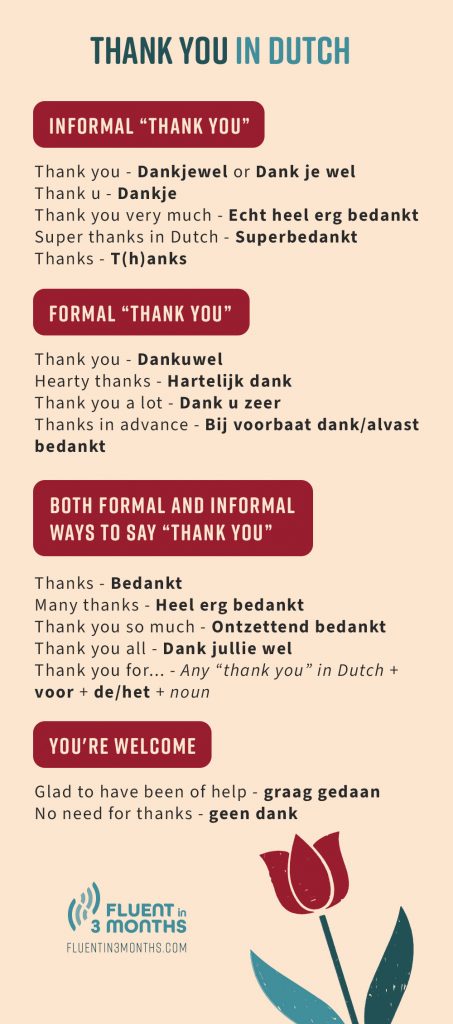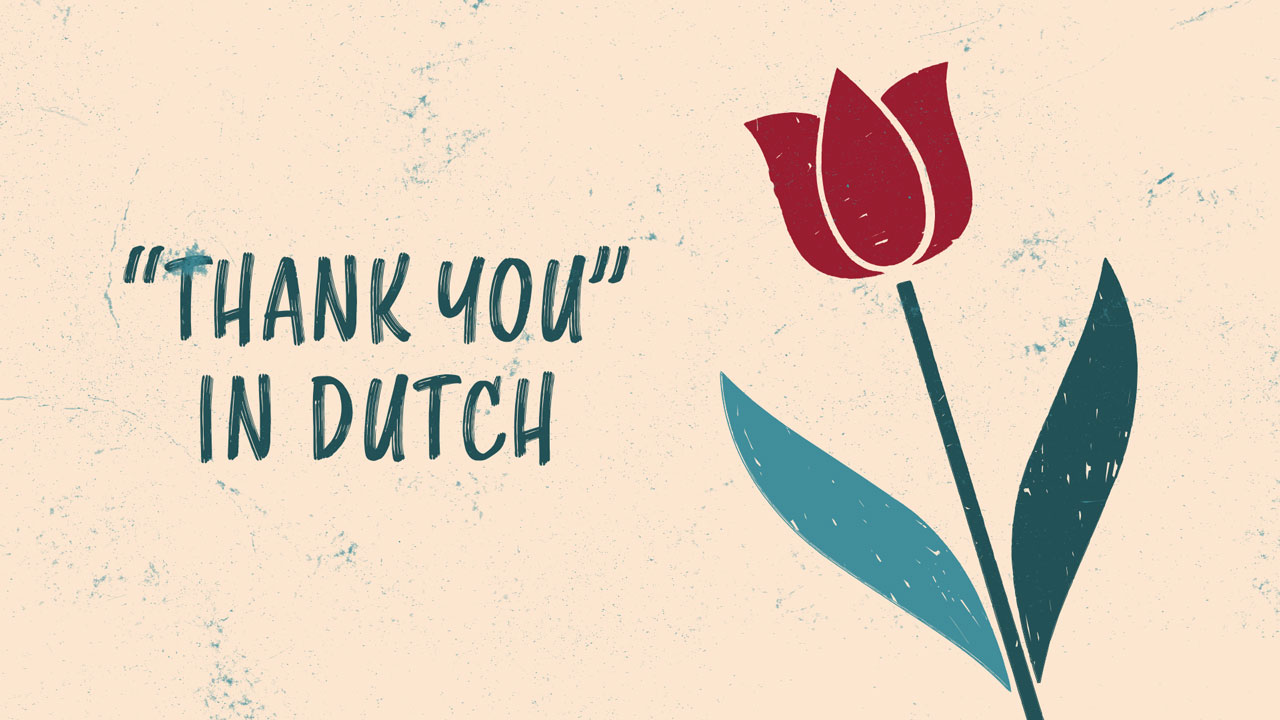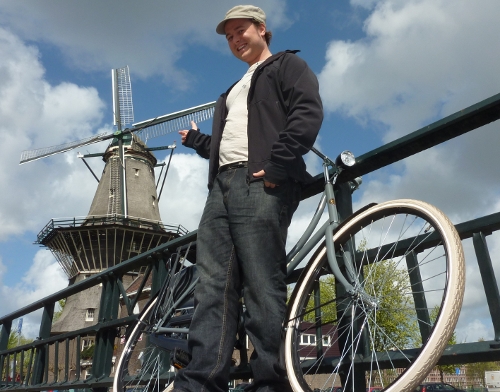14 Ways To Say “Thank You” in Dutch (+ 2 Ways to Reply)
Would you like to learn how to say “thank you” in Dutch?
Even though the Dutch can be quite direct and quick-to-the-point in their conversations, saying thank you is just as appreciated by them.
In this article, I’ll teach you 14 ways to say “thank you” in the Netherlands. So the next time someone gives you a beautiful bouquet of Dutch roses or invites you to a birthday party, you’ll have plenty of options to thank them for it.
Plus, I’ve divided them into formal and informal responses, so you’ll be expressing gratitude in the proper Dutch way.
It’s probably one of the first things most tourists/beginner learners want to know: “How do you say thank you in Dutch?” It’s one of the main building blocks of conversation. So let’s get started!
Table of contents

How to Say an Informal “Thank You” in Dutch
You wouldn’t write “thank u” to your boss in an email regarding an important meeting you had yesterday after lunch. It’s the same in the Netherlands: You’ve got to watch out a little when you say the Dutch word for “thank you”.
The Dutch language has both a formal and informal way to address other people: je and u.
Even though you’ll find many natives saying je to everyone, in the beginning, it’s a good practice to use u in the following situations:
- With someone who’s obviously older than you.
- With someone who’s in a higher “authority” position (doctors, police officers or your boss)
So in these cases, you’d use the formal way of saying “thank you” (I’ll share those in a moment).
But since you most likely won’t find yourself in those highly formal situations often, let’s start with the most common informal way of saying “thank you” in Holland.
1. “Thank you” in Dutch – Dankjewel
You’ll hear this all the time in the Netherlands. And for good reason: It’s the simplest way of saying thank you in the Dutch language. It’s also the one that most beginners learn first.
It’s actually very easy to learn. It’s almost a straight translation from English, but with the adverb “well” added to the end. It emphasizes that you’re thanking someone with good intentions.
If you’re reading Dutch, then you might see several different spellings of this word/words.
- Dankjewel
- Dank je wel
Both are correct. Also, there’s no difference in pronunciation, as most Dutch people speak these words quickly.
At first, you may not be able to distinguish that those are actually three words, melded together as one.
Fun experiment: If you want to confuse a Dutch person about their own language, ask them which of the two versions is the correct spelling. Most will likely not know the answer, and will be pleasantly surprised when you tell them they’re both correct!
2. “Thank u” in Dutch – Dankje
If you want to quickly thank someone, and you’re speaking to someone you’re close to, shorten dankjewel by skipping the wel at the end. This makes it a little more affectionate and conversational.
3. “Thank you very much” in Dutch – Echt heel erg bedankt
If you want to know how to say “thank you very much” in Dutch, this is the correct way to say it.
I recommend only saying it when you’re indeed incredibly grateful for something someone did for you. It would be slightly weird to thank a friend for passing the salt for your patat met mayonaise (“chips with mayonnaise”), for example.
It’s a perfect way of saying thanks when you get a great gift for your birthday – or when a Dutch person takes the time to speak Dutch with you for 20 minutes, instead of switching to English right away!
It’s a tough phrase to translate directly into English, but the translation would be something like “really very much thanks”.
4. “Super thanks” in Dutch – Superbedankt
This one isn’t that common, but you might hear it between close friends or family.
When saying this, it’s obvious that you’re very grateful to the other person. It can also be funny to say this in a sarcastic way when someone feels as if they’re doing you a huge favour – whereas in reality, they aren’t helping you at all.
5. “Thanks” in Dutch – T(h)anks
The Dutch language is incorporating English more and more. And the language is already one of the closest to English in the first place! It’s also very close to German, so if you know German already, you have a huge advantage when learning Dutch.
With this in mind, it shouldn’t come as a surprise that you can simply say thanks in Dutch.
The only difference to the English “thanks” is that many Dutchies skip the “h”. It creates a Dutch version that can sound funny to native English speakers. It sounds like “tanks”.
Yes, like the ones that drive around on battlefields shooting at the enemy. If you hear someone screaming “tanks” on the street – it’s just someone thanking another person!
How to Say a Formal “Thank You” in Dutch
Now you’ve learned some informal ways of saying “thank you” in Dutch, let’s look at the more formal phrases for showing gratitude.
As a reminder, it’s a good idea to use these formal ways of saying “thank you”:
- With someone who’s obviously older than you
- With someone who’s in a higher “authority” position (doctors, police officers or your boss)
6. Formal “Thank you” in Dutch – Dankuwel
Dankuwel is very similar to dankjewel, only the informal je has been replaced by the formal u. You can say this in virtually any formal situation, such as when you get your passport back from customs.
Or when a police officer helps you find directions to the Dam Square, after you got lost wandering around the Amsterdam canals. (In my defense, they all look incredibly similar. Even natives who don’t live in Amsterdam tend to get lost there over and over again).
7. “Hearty thanks” in Dutch – Hartelijk dank
If you want to add some emotion to your formal thanks, then this is the way to go. It’s commonly used by public speakers after a long presentation.
8. “Thank you a lot” in Dutch – Dank u zeer
There’s a high chance you’ll never hear this direct translation of “thanks a lot” in Dutch.
The word zeer has two meanings, both “very” and “hurt”. So it’s good to know that when someone says this, it means he or she is very grateful.
I asked my Dutch friends, and they said this phrase is mainly used by older people. Young people don’t use this phrase anymore, and you can safely skip it unless you want to be a really advanced speaker.
9. “Thanks in advance” in Dutch – Bij voorbaat dank/alvast bedankt
If you’re writing emails in Dutch, then you might want to finish your message by thanking the recipient in advance. Since this will most likely already be a (slightly) formal email exchange, there are two ways to say this.
- Very formal: bij voorbaat dank
- A little less formal: alvast bedankt
As far as its use is concerned, you can ask yourself the question: “If I were writing this email in English, would I add thanks in advance?” If yes, you can also safely use it in Dutch.
Pro tip: To avoid any struggles like this when learning a new language (I mean not knowing if the occasion is right to use a word or not) I try to get exposed as much as possible to the language in real use. I either watch a movie or series in the original language, read a book written in the language, or use podcasts.
For Dutch, I have found DutchPod101 particularly useful.
Both Formal and Informal Ways to Say “Thank You” in Dutch
Since the Netherlands has a low ‘power distance’, everyone feels equal. For instance, the boss isn’t considered better than an employee.
As such, there are several ways to thank someone that can be used in both formal and informal situations. These are great to know if you’re quite unsure about the formality you need in a specific situation.
10. “Thanks” in Dutch – Bedankt
If you like to keep things simple and want to learn just one word to say “thank you” in every situation, that would be bedankt.
Bedankt is the past participle of the verb “to thank” (bedanken). So it’s safe to assume that in the past people used to say ik heb je bedankt (“I have you thanked”). This shortened over time to just bedankt.
It’s probably the second most common way of thanking someone, and it’s slightly more formal than dankjewel. The absence of je or u makes the word very easy to use, as you cannot accidentally mistake the formality.
You can say bedankt to a cashier when you’re doing groceries, or when thanking your captain after a boat trip through Amsterdam.
11. “Many thanks” in Dutch – Heel erg bedankt
“Many thanks” in Dutch is like a shortened version of echt heel erg bedankt, which we discussed before. The absence of echt makes it a bit less emotional, although it’s still something you’d only say when you’re really grateful.
12. “Thank you so much” in Dutch – Ontzettend bedankt
The literal translation of ontzettend is “enormous”, so the literal translation of ontzettend bedankt would be “enormous thanks”. A better translation is “thank you so much”. It can be compared to super bedankt, but more suited for general use.
13. “Thank you all” in Dutch – Dank jullie wel
In English, the word “you” can be used to address individuals and groups in both formal and informal situations. Dutch isn’t like that. There’s a separate word for “you” in Dutch when you’re addressing a group: jullie.
So naturally, as you’d expect from dankjewel (informal) and dankuwel (formal), there’s also dankjulliewel (plural). This is used when you’re thanking more than one person. For example, you might say dankjulliewel after you’ve had a delicious boerenkool stamppot met braadworst (“kale stew with bratwurst”) dinner at a Dutch couple’s home.
14. How to say “Thank you for…” in Dutch
Often when you say “thanks”, you want to show your gratitude for something specific. This is another part where Dutch and English are similar, as you simply say dankje voor….
When the Pope visits the Netherlands, he always says bedankt voor de bloemen (“thanks for the flowers”).
When you’re saying “thank you for” in Dutch, you can use this simple formula:
Any “thank you” in Dutch + voor + de/het + noun
Two Ways to Say “You Are Welcome” in Dutch
I couldn’t let you go without knowing how to say “you’re welcome”. Imagine being thanked, and seeming rude because you have no idea how to reply!
So how do you respond to thank you in Dutch?
There are two common ways:
- Graag gedaan – “glad to have been of help”
- Geen dank – “No need for thanks”
One Final Thing to Watch Out For When Saying “Thank You” in Dutch
In English, if someone asks if you’d like a beer or coffee, and you say “thank you”, people will assume you mean “yes”, or at least double check to see whether you meant “no, thank you”.
In Holland, if you only say dankjewel, there’s a good chance people would assume you mean “no”. It’s seen as a polite refusal of your offer.
So if someone asks you if you want something, be sure to say ja (“yes”), before thanking them for the offer.
Now it’s over to you! Do you now feel comfortable expressing your gratitude in Dutch? Let me know by leaving a comment on my Instagram (@languagehacking), TikTok (@irishpolyglot), and Twitter (@irishpolyglot).
Heel erg bedankt for taking the time to read my tips!




Social